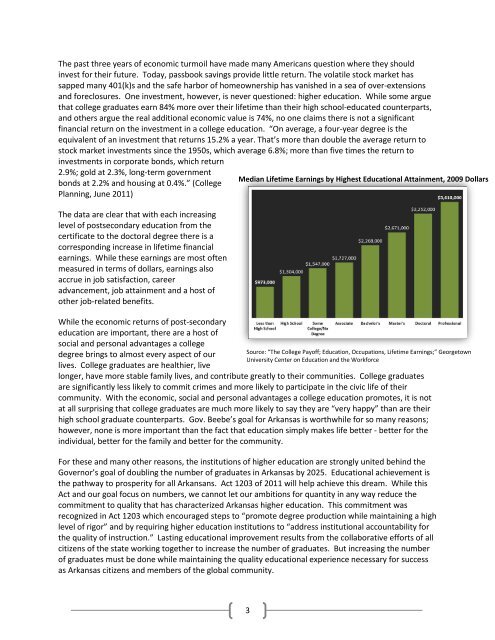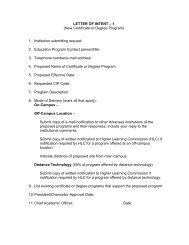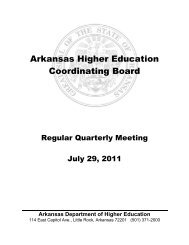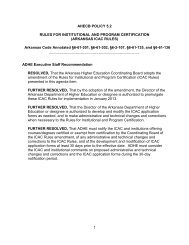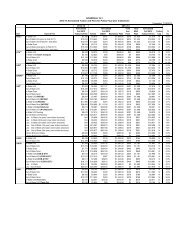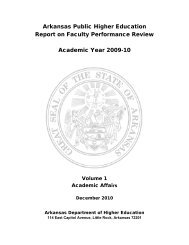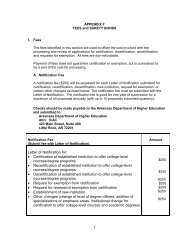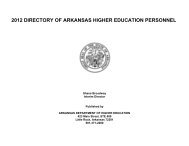ADHE Performance Funding System Report - Arkansas Department ...
ADHE Performance Funding System Report - Arkansas Department ...
ADHE Performance Funding System Report - Arkansas Department ...
You also want an ePaper? Increase the reach of your titles
YUMPU automatically turns print PDFs into web optimized ePapers that Google loves.
The past three years of economic turmoil have made many Americans question where they should<br />
invest for their future. Today, passbook savings provide little return. The volatile stock market has<br />
sapped many 401(k)s and the safe harbor of homeownership has vanished in a sea of over-extensions<br />
and foreclosures. One investment, however, is never questioned: higher education. While some argue<br />
that college graduates earn 84% more over their lifetime than their high school-educated counterparts,<br />
and others argue the real additional economic value is 74%, no one claims there is not a significant<br />
financial return on the investment in a college education. “On average, a four-year degree is the<br />
equivalent of an investment that returns 15.2% a year. That’s more than double the average return to<br />
stock market investments since the 1950s, which average 6.8%; more than five times the return to<br />
investments in corporate bonds, which return<br />
2.9%; gold at 2.3%, long-term government<br />
Median Lifetime Earnings by Highest Educational Attainment, 2009 Dollars<br />
bonds at 2.2% and housing at 0.4%.” (College<br />
Planning, June 2011)<br />
The data are clear that with each increasing<br />
level of postsecondary education from the<br />
certificate to the doctoral degree there is a<br />
corresponding increase in lifetime financial<br />
earnings. While these earnings are most often<br />
measured in terms of dollars, earnings also<br />
accrue in job satisfaction, career<br />
advancement, job attainment and a host of<br />
other job-related benefits.<br />
While the economic returns of post-secondary<br />
education are important, there are a host of<br />
social and personal advantages a college<br />
degree brings to almost every aspect of our<br />
lives. College graduates are healthier, live<br />
Source: “The College Payoff; Education, Occupations, Lifetime Earnings;” Georgetown<br />
University Center on Education and the Workforce<br />
longer, have more stable family lives, and contribute greatly to their communities. College graduates<br />
are significantly less likely to commit crimes and more likely to participate in the civic life of their<br />
community. With the economic, social and personal advantages a college education promotes, it is not<br />
at all surprising that college graduates are much more likely to say they are “very happy” than are their<br />
high school graduate counterparts. Gov. Beebe’s goal for <strong>Arkansas</strong> is worthwhile for so many reasons;<br />
however, none is more important than the fact that education simply makes life better - better for the<br />
individual, better for the family and better for the community.<br />
For these and many other reasons, the institutions of higher education are strongly united behind the<br />
Governor’s goal of doubling the number of graduates in <strong>Arkansas</strong> by 2025. Educational achievement is<br />
the pathway to prosperity for all Arkansans. Act 1203 of 2011 will help achieve this dream. While this<br />
Act and our goal focus on numbers, we cannot let our ambitions for quantity in any way reduce the<br />
commitment to quality that has characterized <strong>Arkansas</strong> higher education. This commitment was<br />
recognized in Act 1203 which encouraged steps to “promote degree production while maintaining a high<br />
level of rigor” and by requiring higher education institutions to “address institutional accountability for<br />
the quality of instruction.” Lasting educational improvement results from the collaborative efforts of all<br />
citizens of the state working together to increase the number of graduates. But increasing the number<br />
of graduates must be done while maintaining the quality educational experience necessary for success<br />
as <strong>Arkansas</strong> citizens and members of the global community.<br />
3


